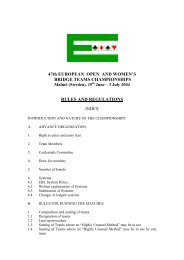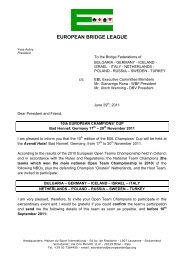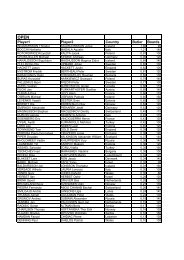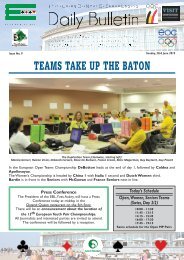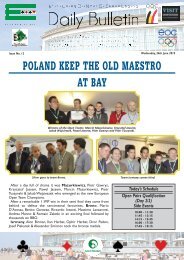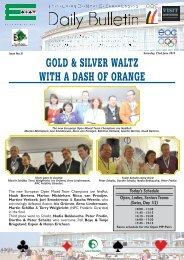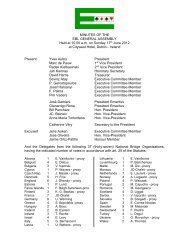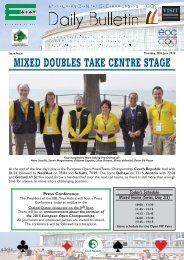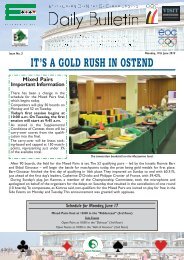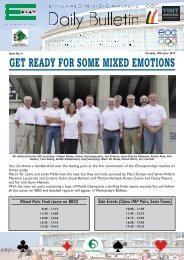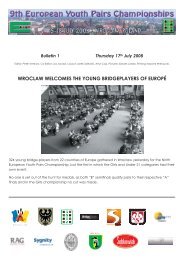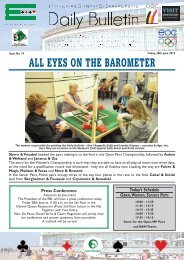Rules & Regulations - European Bridge League
Rules & Regulations - European Bridge League
Rules & Regulations - European Bridge League
You also want an ePaper? Increase the reach of your titles
YUMPU automatically turns print PDFs into web optimized ePapers that Google loves.
6 th EUROPEAN SENIOR<br />
BRIDGE TEAMS CHAMPIONSHIP<br />
Malmö (Sweden), 19 th June – 3 July 2004<br />
RULES AND REGULATIONS<br />
INDEX<br />
INTRODUCTION AND NATURE OF THE CHAMPIONSHIP<br />
A. ADVANCE ORGANIZATION<br />
1. Right to enter and entry fees<br />
2. Team members<br />
3. Credentials Committee<br />
4. Draw for numbers and format<br />
5. Number of boards<br />
6. Systems<br />
6.1 System Policy<br />
6.2 Written explanations of systems<br />
6.3 Convention Cards with Supplementary Sheets<br />
B. RULES FOR RUNNING THE MATCHES<br />
1. Composition and seating of teams<br />
1.1 Designation of teams<br />
1.2 Line-up procedure<br />
1.3 Seating of Home Team and Away Team<br />
1.4 Substitutes<br />
2. Time procedure and penalties for slow play<br />
2.1 Start of the match<br />
2.2 End of the match<br />
2.3 Penalty warning<br />
3. General rules during play<br />
3.1 Language
6 th <strong>European</strong> Seniors Teams Championship<br />
<strong>Rules</strong> & <strong>Regulations</strong><br />
3.2 Dealing<br />
3.3 Duplication and movement of boards<br />
3.4 Non-playing pairs<br />
3.5 Finish of play<br />
3.6 Leaving the Closed Room<br />
3.7 Authorized persons in the Closed Room<br />
3.8 Scoring at the table<br />
3.9 Use of the systems<br />
4. End of rounds, results<br />
4.1 IMP scale<br />
4.2 VP scale<br />
4.3 Penalty points<br />
4.4 Scoring of results<br />
4.5 Protest time<br />
4.6 Official results<br />
4.7 Publication of decisions<br />
5. Byes, Ranking and Ties<br />
5.1 Byes<br />
5.2 Ranking<br />
5.3 Ties<br />
C. REGULATIONS SUPPLEMENTING THE LAWS<br />
1. Screens, Bidding Boxes and International Code<br />
1.1 Bidding Boxes<br />
1.2 Screens<br />
1.3 International code<br />
2. Alerting<br />
3. Fouled boards (twice duplicated)<br />
3.1 Twice duplicated boards<br />
3.2 Incorrect number of cards<br />
3.3 Penalty for miscounting<br />
3.4 Replay of fouled board<br />
3.5 Mis-duplication<br />
4. Fouled boards (once duplicated)<br />
4.1 Once duplicated boards<br />
4.2 Replay of boards<br />
4.3 Penalties for fouled board<br />
D. ETHICS<br />
1. Player’s obligations<br />
2. Looking at partner<br />
3. Discussions<br />
4. Partnership understandings<br />
2
E. NON-PLAYING CAPTAINS<br />
1. Rights of a non-playing captain<br />
2. Conversation at the table<br />
3. Substitute captains<br />
F. VIEWGRAPH & REGISTRATION AND PUBLICATION OF MATCHES AND<br />
IMAGES<br />
1. Obligation to play<br />
2. Dealing of cards<br />
3. Access to Viewgraph Room<br />
4. Playing time<br />
5. Registration and Publication<br />
G. APPEALS AND APPEALS COMMITTEE<br />
1. Appeals<br />
1.1 Procedure<br />
1.2 Practices in the Appeal Committee<br />
2. Appeal Committee<br />
2.1 Composition of the appeal Committee<br />
2.2 Investigations<br />
2.3 Judgement<br />
H. JOURNALISTS AND SPECTATORS<br />
1. Journalists<br />
1.1 Application of these <strong>Rules</strong> and <strong>Regulations</strong><br />
1.2 Accreditation<br />
2. Spectators<br />
2.1 Application of these <strong>Rules</strong> and <strong>Regulations</strong><br />
2.2 Watching at Table<br />
I. OFFICIALS IN CHARGE<br />
1. Officer-in-charge<br />
1.1 Identification<br />
1.2 Functions<br />
2. Tournament Directors<br />
2.1 General duties of Tournament Directors<br />
2.2 Adjusted score<br />
2.3 Slow play penalty<br />
2.4 Significant <strong>Rules</strong> and Laws<br />
2.5 Infringement of properties<br />
2.6 Appeal procedure<br />
6 th <strong>European</strong> Seniors Teams Championship<br />
<strong>Rules</strong> & <strong>Regulations</strong><br />
3
J. NON SMOKING, ALCOHOL AND MOBILE PHONES<br />
1. Non Smoking<br />
2. Alcohol<br />
3. Mobile phones<br />
K. IOC CONFORMANCE<br />
1. Dress Code<br />
L. CHANGES TO REGULATIONS<br />
6 th <strong>European</strong> Seniors Teams Championship<br />
<strong>Rules</strong> & <strong>Regulations</strong><br />
4
RULES AND REGULATIONS<br />
INTRODUCTION AND NATURE OF THE CHAMPIONSHIP.<br />
The <strong>European</strong> Seniors Teams Championship ("the Championship") is played under<br />
the auspices of the <strong>European</strong> <strong>Bridge</strong> <strong>League</strong> ("the EBL") in Malmö, Sweden,<br />
commencing on Saturday 19 th June 2004 and ending not later than Saturday, 3 rd July<br />
2004. The Championship consists of a complete "round-robin" of matches each of 20<br />
boards, with each team playing against each other team. The results of the matches are<br />
expressed in victory points and the team with the greatest number of victory points at<br />
the completion of the "round-robin" is the winner (and other teams are ranked<br />
according to the number of Victory Points gained).<br />
The Championship is played under the Laws of Duplicate Contract <strong>Bridge</strong> 1997 and<br />
the present <strong>Rules</strong> and <strong>Regulations</strong>, the special provisions of which supplement the<br />
said laws, as required, for this Championship.<br />
A ADVANCE ORGANIZATION<br />
1. Right to enter, and entry fees<br />
Each member country, being up to date with the payment of its dues (including the<br />
2004 dues) to the E.B.L. is authorized to enter one team. Countries must have paid the<br />
entry fee and be up to date with the payment of dues to the EBL (inclusive of 2004<br />
dues) before they may participate in the Championship.<br />
The entry fees are Euro 2,500 per Team.<br />
Entry Fees must be paid by bank transfer before 15 th April 2004 to <strong>European</strong> <strong>Bridge</strong><br />
<strong>League</strong> – Marc De Pauw, Treasurer – Account n° 3097300 – Swift Code<br />
BPPBCHGG – Bank Paribas – 2 Place de Hollande – CH – 1211 Genève 11 -<br />
Switzerland<br />
Each team must play against each other team. Entry and subsequent refusal to play<br />
against another contestant will result in disqualification.<br />
2. Team Members<br />
In addition to a non-playing captain, each team is entitled to have up to six members.<br />
Subject to the approval of the Credentials Committee the members of any team may<br />
be changed up to the time of commencement on the first day of the Championship,<br />
but not thereafter.<br />
6 th <strong>European</strong> Seniors Teams Championship<br />
<strong>Rules</strong> & <strong>Regulations</strong><br />
5
If a country has submitted the names of fewer than six players, a fifth and/or sixth<br />
player may be added after the commencement of play on the first day only with<br />
permission of the Appeals Committee.<br />
3. Credentials Committee<br />
The names of the Captain and members of each team must be sent for approval to:<br />
Mr. Gianarrigo Rona<br />
President, <strong>European</strong> <strong>Bridge</strong> <strong>League</strong><br />
For the EBL Credentials Committee tel: 39-02 7000 0022<br />
Via Ciro Menotti 11/C fax: 39-02 7000 1398<br />
20129 Milano, Italy. Email: ebl@federbridge.it<br />
by 15 th April 2004.<br />
Every proposed player must, along with other criteria, satisfy the Credentials<br />
Committee that he was born on or before the 18 th June 1949 and:<br />
(i) in respect of Category (i) teams:<br />
a. he is nominated by the NBO of the country of his birth or the NBO of which such<br />
nominated player first became a member, and has not, during the current or<br />
immediately preceding calendar year, represented a different NBO in any EBL or<br />
WBF competition or any zonal or intra-zonal competition; or<br />
b. he is nominated by the NBO of the country of his citizenship or bona fide residence<br />
and has not, during the current or immediately preceding two calendar years,<br />
represented a different NBO in any EBL or WBF competition or any zonal or intrazonal<br />
competition. A bona fide resident is a person who is living for at least six<br />
months of the year in the said country and of whom this has been the case in the<br />
twelve calendar months prior to entry.<br />
4. Draw for numbers and format<br />
Prior to play an official draw for numbers in the schedule of play and the format of<br />
the Championship will be made and will be published in the programme.<br />
5. Number of boards<br />
Each team will play one match against each other team. Matches of 20 boards will each be<br />
played in a single session without seating change. Changes in the number of boards to be<br />
played in the Championship will be notified in the programme.<br />
6 th <strong>European</strong> Seniors Teams Championship<br />
<strong>Rules</strong> & <strong>Regulations</strong><br />
6
6. Systems<br />
6.1 Systems Policy<br />
(a) The <strong>European</strong> <strong>Bridge</strong> <strong>League</strong>’s Systems Policy 2000 ("the SYSTEMS POLICY")<br />
applies to the Championship. Only Category 3 systems and conventions are permitted.<br />
(b) Each player must agree with partner to use the same methods in the auction and<br />
also in the card play.<br />
6.2 Written explanations of systems<br />
Every partnership that will play in the Championship must complete, accurately and<br />
legibly, an E.B.L. approved Convention Card (with supplementary sheets as<br />
appropriate) in accordance with "the SYSTEMS POLICY". [Convention cards may be<br />
prepared using any of the following programs: WBF Convention Card Editor<br />
(Windows version) free from www.bridge.gr or http://www.ecatsbridge.com;<br />
alternatively the Convention Card Editor written by Lee Edwards available from<br />
www.acbl.org; also the DOS Convention Card Editor provided free of charge by the<br />
WBF. If in difficulty please consult your NBO.]<br />
A partnership may lodge a comprehensive statement of its methods (which may be of<br />
any length but must be in English) at the Systems Desk prior to the commencement of<br />
the Championship for the attention of the Appeals Committee. Any statement so<br />
lodged will be used by the Director and the Appeals Committee (and may be used by<br />
the partnership in argument before the Appeals Committee) to assist in determining<br />
whether or not full, proper and timely information was given to the opponents as to<br />
the meaning of calls made in the auction by the partnership and of any related<br />
partnership understanding.<br />
6.3 Convention Cards with Supplementary Sheets<br />
In respect of every partnership one copy of the Convention Card with supplementary<br />
sheets must be handed to the Tournament Organizers at least two hours before the<br />
start of the Championship. Possession by the Organizers of such copy does not signify<br />
that its contents have been examined and found acceptable. A further copy of the<br />
Convention Card and supplemental sheets must be handed to each opponent before<br />
the start of the match.<br />
B RULES FOR RUNNING THE MATCHES<br />
1. Composition and seating of teams<br />
1.1 Designation of teams<br />
The team mentioned first in the schedule of matches printed in the programme is<br />
designated as the Home Team. Its opponent is the Away Team.<br />
6 th <strong>European</strong> Seniors Teams Championship<br />
<strong>Rules</strong> & <strong>Regulations</strong><br />
7
1.2 Line-up procedure<br />
Line ups have to be given without seating rights, without knowledge of the line<br />
up of the opposing team. For all matches both teams have to line up at least<br />
20 minutes before the official starting time of the match.<br />
Repeated violations of these time schedules will be subject to VP penalties according<br />
to this scale:<br />
1st occasion a written warning<br />
2nd occasion ½ VP penalty<br />
Subsequently 1 VP penalty for each occasion.<br />
1.3 Seating of Home Team and Away Team<br />
The following seating arrangements shall apply: the teams meet according to the<br />
schedule printed in the programme. The Home Team sits throughout in the N/S<br />
position in the Open Room and in the E/W position in the Closed Room.<br />
1.4 Substitutes<br />
If for whatever reason a team is unable to produce four players, the Tournament<br />
Director is empowered to designate a substitute to complete the team. A substitute so<br />
designated need not be a national of the country for which he/she substitutes. A<br />
substitute cannot be a player of another team. The decision as to whether the result of<br />
a match in which a substitute has played shall stand, either partly or wholly, and what<br />
penalties, if any, may be imposed, shall rest with the Appeals Committee which will<br />
adjudicate upon every case in which a substitute plays.<br />
The Tournament Director, having designated a substitute, shall inform a member of<br />
the Appeals Committee on duty as soon as possible and furnish the Appeals<br />
Committee with a written report.<br />
2. Time procedure and penalties for slow play.<br />
2.1 Start of the round (of 20 boards)<br />
At the beginning of each round the Tournament Director on duty will announce the<br />
time by which the round must be completed: for play of twenty (20) boards the tima<br />
allowed will be two hous and fifty minutes (2 hrs 50).<br />
The starting times for the rounds are 10.30h, 14.15h and 17.40h.<br />
The period allowed is calculated from the commencement of the period of play and includes<br />
the time for system explanation and scoring procedure. Play in the Open Room between two<br />
opposing teams may start only when the players of the same teams are seated in the Closed<br />
Room. Any team that is not seated and ready to play at the start of a period of play will be<br />
6 th <strong>European</strong> Seniors Teams Championship<br />
<strong>Rules</strong> & <strong>Regulations</strong><br />
8
fined 1 VP and for each completed period of 5 minutes thereafter a further 1VP. Players are<br />
requested to be seated 5 minutes before the scheduled start of play.<br />
If any team has been fined for being late at the commencement of a round the fines for slow<br />
play in the same round will be based on the time at which all players were seated at the table<br />
and ready to play.<br />
2.2 End of the match (of 20 boards)<br />
a. If at the end of the allocated time play has not been completed fines will be<br />
imposed as follows:<br />
from 0 to 5 minutes late: a fine of 1 VP will be imposed on the table and shared 0.5<br />
VP to each team if they are considered to share equal responsibility for overrunning.<br />
from 5 to 10 minutes late: 2VPs imposed on the table, shared likewise 1 VP each<br />
from 10 to 15 minutes late: 4 VPs likewise<br />
from 15 to 20 minutes late: 6 VPs likewise<br />
from 20 to 25 minutes late: 10 VPs likewise<br />
for delays of more than 25 minutes the Appeals Committee may impose a more severe<br />
penalty.<br />
b. If a pair wishes to claim that the responsibility for the slow play is with their<br />
opponents, they will do so by calling the Tournament Director who will take<br />
any necessary corrective measure, including the designation in his discretion<br />
of a monitor at the table for such period as the Director thinks fit.<br />
c. The Tournament Director will normally issue warnings when teams are in<br />
danger of penalties for slow play, but his failure to do so does not diminish the<br />
responsibility of the players.<br />
d. If the two sides at the table are not considered to bear equal responsibility for<br />
the late finish the prescribed penalty in (a) will be divided between the two<br />
teams proportionately to the extent to which each side is deemed to have<br />
contributed to the overrun.<br />
e. It is a serious breach of propriety deliberately to break a Law or Rule even if<br />
one is willing to accept the prescribed penalty. Accordingly, over and above<br />
the prescribed penalties, the Tournament Director may impose an additional<br />
penalty in cases where he is of the opinion that players are indulging<br />
deliberately in unnecessarily slow play. The following regulations will be<br />
observed in putting this rule into effect:<br />
1. No such penalty will be awarded unless the Tournament Director has given<br />
previous verbal warning to the players concerned of his intention to invoke this rule.<br />
6 th <strong>European</strong> Seniors Teams Championship<br />
<strong>Rules</strong> & <strong>Regulations</strong><br />
9
2. Such penalty may be imposed only in respect of continued delay in the same<br />
session of play as that in which a verbal warning has been given.<br />
3. The penalty may, in the discretion of the Tournament Director, be imposed on one<br />
only or on both of the teams involved in the match in which such a delay occurs, or, at<br />
his discretion, a larger penalty may be imposed on one team than upon the other to<br />
reflect each team’s responsibility for the occurrence.<br />
4. The penalty imposed will take the form of ½ (or more) VPs to be deducted from an<br />
offending team's score.<br />
2.3 Penalty warning<br />
Except for a penalty under 2.2c above all penalties for violation of time procedure and<br />
slow play are mandatory and require no previous warning to the players that penalties<br />
will be applied.<br />
3. General rules during play<br />
3.1 Language<br />
All players are reminded that the official language of the Championship is English<br />
and during a match the players are expected to converse in this language only.<br />
3.2 Dealing<br />
The boards will have been pre-dealt and duplicated.<br />
3.3 Duplication and movement of boards<br />
(a) Wherever possible boards will be duplicated so that boards are not transferred<br />
from the Open Room to the Closed Room or vice-versa. (See also Rule C3 - Fouled<br />
Boards)<br />
(b) When it is not possible for the boards to be so duplicated the following provisions<br />
will apply:<br />
The tables will be numbered in a logical manner so that it is easy to identify<br />
corresponding tables (one in the Open and one in the Closed Room). Similarly the<br />
boards will be clearly labelled so they correspond to a particular pair of tables (one in<br />
the Open Room and one in the Closed Room).<br />
The North and East players at every table are required, at the beginning of each<br />
match, to complete curtain cards by writing the names of their respective countries<br />
thereon, and then to place such curtain card in the pocket of the first board played<br />
corresponding to his position.<br />
The boards will be changed in due course between the Open and the Closed Rooms<br />
by the board movers. The players are required to check that the boards given to them<br />
by the board movers are the correct boards, and that they are played in the correct<br />
polarity. To do this:<br />
6 th <strong>European</strong> Seniors Teams Championship<br />
<strong>Rules</strong> & <strong>Regulations</strong><br />
10
(1) The players should check that the boards bear labels which correspond to the<br />
tables at which they are playing<br />
(2) North and East should each check the curtain card completed by their respective<br />
opponents in the same seats in the other room.<br />
3.4 Non-playing pairs<br />
Non-playing members of a team are not allowed to watch their team mates playing.<br />
3.5 Finish of play<br />
At each table when play has finished the players should agree the scores and then<br />
leave the Room (Open or Closed) as quickly as possible.<br />
3.6 Leaving the Closed Room<br />
No player may leave the Closed Room during a match unless accompanied by a<br />
person designated by the Tournament Director. If any player leaves the Closed Room<br />
during a round without permission of the Tournament Director, his team will be fined<br />
2 VPs.<br />
No recorder - see B.3.9.b below - may leave the Closed Room during the round unless<br />
accompanied by a person designated by the Tournament Director. If a recorder leaves<br />
the Closed Room during a match without permission of the Tournament Director the<br />
Away Team of the match at which the recorder was acting will be fined 2 VPs.<br />
These penalties may not be waived.<br />
3.7 Authorized persons in the Closed Room<br />
Authorized persons who may enter the Closed Room (except by special permission of<br />
the Chairman of the Tournament Committee) are:<br />
- the Officer in Charge<br />
- the Tournament Director, scorers, recorders and board movers on duty in the<br />
Closed Room<br />
- the Chairman of the Appeals Committee and the members of the Appeals<br />
Committee on duty<br />
- the President of the E.B.L.<br />
- the Chairman of the Tournament Committee<br />
- the captains of the away teams (or their respective duly approved designates) but<br />
only for the purpose of recording; see B.3.9.b below.<br />
6 th <strong>European</strong> Seniors Teams Championship<br />
<strong>Rules</strong> & <strong>Regulations</strong><br />
11
- two duly accredited journalists plus one representative of the Bulletin, all of<br />
whom must remain for the entire round in the Closed Room; the names of these<br />
must be given to the Chairman of the Tournament Committee and each<br />
must watch at one table only and not move to another.<br />
- Hotel staff for the provision of refreshments.<br />
3.8 Scoring at the table<br />
At each table North is responsible for completing the official score-card, which will<br />
be collected after the teams have decided their results. If matches are being fully recorded<br />
by official scorers North’s responsibility for scoring the official score-card remains.<br />
3.9 Recording the matches<br />
a. In the Open Room, the Captain of the Home Team (or his designate to be approved by the<br />
Captain of the Away Team and the Tournament Director) shall record the bidding, the play in<br />
the first three tricks (and if possible more) and the result on the "Recording Form" provided at<br />
the table.<br />
b. In the Closed Room, the Captain of the Away Team (or his designate to be approved by the<br />
Captain of the Home Team and the Tournament Director) is responsible for the recording.<br />
3.10 Use of the systems<br />
Players are not authorized to look at their own systems during the bidding and the<br />
play. Players may look at the systems of their opponents at any time during the<br />
bidding but during the play only when it is their turn to play.<br />
4. End of rounds, results<br />
4.1 IMP scale<br />
In all matches the difference in the total point scores on each board is to be converted<br />
to International Match Points (IMPs) according to the following scale:<br />
0 - 10 0 370 - 420 9 1750 - 1990 18<br />
20 - 40 1 430 - 490 10 2000 - 2240 19<br />
50 - 80 2 500 - 590 11 2250 - 2490 20<br />
90 - 120 3 600 - 740 12 2500 - 2990 21<br />
130 - 160 4 750 - 890 13 3000 - 3490 22<br />
170 - 210 5 900 - 1090 14 3500 - 3990 23<br />
220 - 260 6 1100 - 1290 15 4000 and upward 24<br />
270 - 310 7 1300 - 1490 16<br />
320 - 360 8 1500 - 1740 17<br />
6 th <strong>European</strong> Seniors Teams Championship<br />
<strong>Rules</strong> & <strong>Regulations</strong><br />
12
4.2 VP scale For each match there will be between 25 and 30 Victory Points (VPs) at<br />
stake to be apportioned between the two teams in accordance with the following scale:<br />
IMPs diff. VPs IMPs diff. VPs IMPs diff. VPs<br />
0 - 2 15 - 15 22 - 26 20 - 10 48 - 53 25 - 5<br />
3 - 8 16 - 14 27 - 31 21 - 9 54 - 59 25 - 4<br />
9 - 12 17 - 13 32 - 36 22 - 8 60 - 65 25 - 3<br />
13 - 16 18 - 12 37 - 41 23 - 7 66 - 72 25 - 2<br />
17 - 21 19 - 11 42 - 47 24 - 6 73 - 79 25 - 1<br />
4.3 Effect of penalty points:<br />
6 th <strong>European</strong> Seniors Teams Championship<br />
<strong>Rules</strong> & <strong>Regulations</strong><br />
80 and more 25 - 0<br />
In no case will a penalty imposed under these <strong>Rules</strong> benefit the score of the nonoffending<br />
side.<br />
4.4 Scoring of results<br />
Both teams are required to score the results at the end of each match. Both teams will<br />
be supplied with an official "Result Card". If possible the captains of the respective<br />
teams should agree the score and sign the "Result Card". In any event both captains<br />
must hand the Result Card (if possible signed by both captains) to the official on duty<br />
at the results desk within 10 minutes of the end of the match.<br />
4.5 Protest time<br />
Protest time in respect of scores and results ends at the starting time of the first match<br />
on the day following, and in respect of the final day’s play two hours after the official<br />
finishing time of the final match.<br />
4.6 Official results<br />
If at the end of protest time no protest has been lodged, the posted result shall become<br />
the official result of the match with the exception of:<br />
a. any score adjustment arising from the hearing of an appeal;<br />
b. adjustment in respect of any fines to which either team is liable;<br />
c. completion of scores following the replay of one or more boards where such a<br />
replay has been ordered<br />
13
d. An official result may be altered only by written notice from the Director, the<br />
Tournament Committee or the Tournament Appeals Committee.<br />
4.7 Publication of decisions<br />
All decisions involving play, penalties, deals, infringement of the <strong>Rules</strong>, etc., will be<br />
posted in the Captain’s pigeon hole. However, the fact that a penalty has not yet been<br />
posted and that the attention of the players or captains has not yet been drawn to it<br />
does not nullify the penalty.<br />
5. Byes, Ranking and Ties<br />
5.1 Byes<br />
In the event of a team having a bye in any session it will receive 18 VPs. A team must<br />
play against each other team against which it is drawn. A team will score zero if for<br />
extraneous reasons it is not able to play against another team. Its opponents will<br />
receive a figure arrived at by taking the average score obtained against the defaulting<br />
team by the eight teams nearest in the ranking list to themselves at the end of the<br />
Championship or 18 VPs, whichever is the greater.<br />
5.2 Ranking<br />
The teams will be ranked according to the total number of VPs each gains in the<br />
Championship.<br />
5.3 Ties<br />
A tie between two teams will be broken in accordance with the result of the match<br />
between those two teams. Where that match has resulted in a tie in VPs, any<br />
difference in IMPs will decide. When there is no difference in IMPs scored, the tie<br />
will be broken by total points scored in that match. If there should still be a tie, then<br />
the IMP quotient of all matches will be taken into consideration to break the tie.<br />
Where more than two teams have the same number of VPs the tie will be decided by<br />
the result of the matches between those teams. If one of the teams has defeated all the<br />
other teams involved, it will be ranked ahead of the others regardless of the number of<br />
VPs obtained.<br />
The other tied teams will be ranked according to the VPs obtained in the matches<br />
between them. If a further tie should still exist then the IMP quotient of all matches<br />
will be taken into consideration to break the tie.<br />
C REGULATIONS SUPPLEMENTING THE LAWS<br />
1. Screens, Bidding Boxes and International Code<br />
1.1 The use of bidding boxes is mandatory throughout. A call is made by the player<br />
placing his selected bidding card in front of him. A player’s first call should be to the<br />
6 th <strong>European</strong> Seniors Teams Championship<br />
<strong>Rules</strong> & <strong>Regulations</strong><br />
14
left with subsequent calls overlapping neatly and evenly to the right. When the<br />
auction has been completed and all four players have had an opportunity to review the<br />
auction the players shall replace their bidding cards in the respective pockets of the<br />
bidding box.<br />
1.2 The use of screens mandatory throughout and the following shall apply.<br />
The screen is placed diagonally across the table in such fashion that North and East,<br />
South and West are respectively screen-mates. The board is placed in the middle of a<br />
moveable tray. The screen is closed so that the bidding tray can just pass under it. The<br />
players now remove their cards from the board.<br />
Starting with the dealer, players place bidding cards silently on their section of the<br />
tray, from the extreme left-hand edge, neatly overlapping so that all calls are visible<br />
and faced towards partner. A call is considered to have been made when a player<br />
releases it onto the tray (but subject to provisions elsewhere in these rules and<br />
regulations Law 25 may apply).<br />
North and South pass the tray under the screen after their screenmate has called, and<br />
the tray should be placed so that all calls are visible on the other side. There shall be<br />
no oral communication at the table during the auction period. After the final pass,<br />
players remove their bidding cards.<br />
The opening lead shall be made face-down. Opening leader’s screenmate announces<br />
that the lead has been made; a defender raises the screen, and play proceeds. The<br />
screen is raised only to a level that permits all players to see all the cards.<br />
1.3 The Laws of Duplicate Contract <strong>Bridge</strong> 1997 apply except, with screens in use, as<br />
specified below:<br />
LAW 9A2(b)(1); LAW 42b(3); LAW 43A(1)(b):<br />
Dummy may call attention to a defender’s card prematurely exposed by his<br />
screenmate, but should try to avoid exposure of a premature opening lead.<br />
LAW 20:<br />
Review of the Auction:<br />
Until the bidding cards are removed from the tray, a player obtains a review of the<br />
auction by inspecting them. At trick one, until the player loses his entitlement to<br />
obtain a review (see Laws 41B, 41C) and when an inspection of the bidding cards is<br />
no longer feasible, a player obtains a written review of the auction from his<br />
screenmate.<br />
Explanation of calls:<br />
6 th <strong>European</strong> Seniors Teams Championship<br />
<strong>Rules</strong> & <strong>Regulations</strong><br />
15
1. During the Auction:<br />
At any time a player may request, in writing, of his screenmate a full explanation of<br />
an opponent’s call. The reply is also in writing.<br />
2. During the Play Period:<br />
Questions during the play period should be in writing with the aperture closed.<br />
The screen is raised after the response has been made in writing.<br />
3. At no time prior to completion of the hand is there communication between a<br />
player on one side of the screen and a player on the other side of the screen<br />
concerning the auction or explanations given and received.<br />
LAWS 25 THROUGH 32; LAWS 36 THROUGH 39:<br />
The principle in the WBF Code of Practice applies. When it is possible to pass only<br />
the calls in the legal auction through the screen (after any rectification) there are no<br />
penalties and players on the other side of the screen are not informed of any<br />
occurrence. For infractions covered by these laws, the following procedures are used:<br />
A. Tray not Passed:<br />
Before the tray is passed, the offender’s screenmate shall call attention to the<br />
infraction and summon the Director. The Director shall see that the infraction is<br />
rectified without penalty. Infringing calls may not be accepted.<br />
B. Both Sides at Fault:<br />
When the infringing call is nonetheless passed across the screen, both sides being at<br />
fault (as when either player commits a bidding infraction and the proper player -<br />
North or South - moves the tray before rectification), both players on the other side of<br />
the screen are responsible for calling attention to the infraction and summoning the<br />
Director. The Director shall return the tray to the offending players for rectification of<br />
the irregularity without penalty. Infringing calls may not be accepted.<br />
C. Only One Side at Fault:<br />
When the infringing call is passed across the screen with only one side at fault (the<br />
player who committed the bidding infraction - East or West -also moved the tray<br />
improperly), both players on the other side of the screen are responsible for calling<br />
attention to the infraction and summoning the Director. The Director shall return the<br />
tray to the offending player for rectification of the irregularity and the appropriate<br />
penalty is applied. Infringing calls may not be accepted.<br />
D. Irregularity not Noticed:<br />
When the infringing call is passed across the screen, and neither player there draws<br />
attention to it, the tray eventually being returned to the side of the screen where the<br />
6 th <strong>European</strong> Seniors Teams Championship<br />
<strong>Rules</strong> & <strong>Regulations</strong><br />
16
idding irregularity was committed, the auction stands without penalty or<br />
rectification. However, in the case of an inadmissible call, Law 35 applies.<br />
E. Information - Authorized or not:<br />
(i) Information from withdrawn calls is unauthorized for any partnerships at fault<br />
but authorized for a partnership neither of whom has committed an<br />
irregularity. If the Director determines that the unauthorized information<br />
from withdrawn calls precludes normal bidding, he shall award an<br />
artificial adjusted score.<br />
(ii) If a player sees a call on the tray that he has not previously observed because<br />
the tray did not pass fully under the screen, the information is authorized<br />
and may be used until LHO has called.<br />
LAW 33:<br />
The subsequent call is cancelled without penalty.<br />
LAW 40:<br />
Alerts:<br />
When an alertable call is made the player alerts his screenmate. When the tray is<br />
passed, both players should immediately alert partner’s alertable call.<br />
LAW 41A:<br />
Opening Lead out of Turn:<br />
The offender’s screenmate should attempt to prevent any opening lead out of turn. A<br />
faced down lead out of turn is retracted without penalty. A faced opening lead out of<br />
turn is retracted without penalty if the screen has not been raised (the screenmate<br />
should try to prevent the raising of the screen). When the screen has been raised after<br />
a faced opening lead out of turn - through no fault of the declaring side:<br />
a) and the other side has not yet led face up, the lead is considered to be out of turn<br />
and Law 54 applies.<br />
b) and the other side has also led face up, the card becomes a major penalty card.<br />
When the declaring side has incorrectly opened the screen, the lead is accepted. The<br />
Director shall award an adjusted score if he considers that the player who opened the<br />
screen could have known that it would be to his advantage to accept the lead.<br />
6 th <strong>European</strong> Seniors Teams Championship<br />
<strong>Rules</strong> & <strong>Regulations</strong><br />
17
LAW 73D:<br />
During the auction period, after an opponent has acted quickly, it is proper to adjust<br />
the tempo back to normal either by delaying one’s own call (place the bidding card<br />
faced, in front of, but not on the tray) or by waiting before passing the tray.<br />
A delay of the bidding tray on one side of the screen of up to 15 seconds (at any time<br />
during the auction and whether or not out of tempo) shall not normally give rise to<br />
any inference of unauthorized information. Players are strongly advised to vary the<br />
time the tray is passed so that pauses up to 15 seconds (or perhaps longer in<br />
unexpected situations) may be considered not to convey information.<br />
LAW 76:<br />
Spectators:<br />
Spectators may not sit so they can see on both sides of the screen.<br />
2. Alerting<br />
The EBL "Alerting Policy" applies.<br />
Any call which:<br />
(i) has a special or artificial meaning, or<br />
(ii) whose partnership meaning may not be understood by the opponents,<br />
is an “alertable” call which must be brought to the immediate attention of the<br />
opponents through the use of the "alert procedure"<br />
The "alert procedure" is as follows:<br />
A player who makes such a call alerts his screenmate by placing the alert card over<br />
the last call of the screen-mate, in his segment of the bidding tray; the alerted player<br />
must acknowledge by returning the alert card to his opponent.<br />
When the bidding tray is returned to their side of the screen both players are obliged,<br />
before either has made a further call, to alert their screen-mate if partner’s call is<br />
alertable; using the "alert procedure".<br />
It is the obligation of the player making an "alert" to ensure that his screen-mate has<br />
noticed that an "alert" has been made.<br />
A player can ask for an explanation of an opponent’s call. He does so by a written<br />
question to the opponent sitting on the same side of the screen. The opponent gives a<br />
written answer, regardless of whether the question concerned his own or his partner’s<br />
call.<br />
6 th <strong>European</strong> Seniors Teams Championship<br />
<strong>Rules</strong> & <strong>Regulations</strong><br />
18
3. Fouled boards (twice duplicated)<br />
3.1 Twice Duplicated Boards<br />
Where the boards have been twice duplicated - one set for the Open Room and a<br />
second set for the Closed Room - this Regulation C.3 shall apply.<br />
3.2 Incorrect number of cards<br />
All players must count their cards before looking at them. If a hand does not consist<br />
of 13 cards the Tournament Director must be called immediately to correct the misduplication.<br />
3.3 Penalty for mis-counting<br />
If any player looks at his cards before counting and has 14 or more cards the board is<br />
"fouled". The offending side will be penalized ½ VP for each such occasion<br />
3.4 Replay of fouled board<br />
If a board is "fouled" under Rule 3.3 the Tournament Director shall see if he can apply<br />
Law 13 to allow play to continue. If he cannot allow play to continue he shall exercise<br />
his Law 6 authority whenever lawful and reasonably possible to order the board to be<br />
re-dealt and re-played.<br />
3.5 Mis-duplication<br />
Players are required after the play to return all 13 cards to the correct quarter of the<br />
board. If after the round a team alleges a board has been mis-duplicated (so that the<br />
hand is different in the Open Room from the Closed Room) the relevant board in the<br />
Open Room and the Closed Room will be checked. If it is ascertained, on the basis of<br />
cogent evidence, that a board has been mis-duplicated the result on that board will be<br />
cancelled. No re-dealt board will be played.<br />
4. Fouled boards (once duplicated)<br />
4.1 Once duplicated boards<br />
Where the boards have been once duplicated - one set which is played in both the<br />
Open Room and the Closed Room - this regulation C.4 shall apply.<br />
4.2 Replay of boards<br />
a. The Tournament Director shall not order a fouled board to be replayed when the<br />
final result of the match without that board could be known to a contestant. In that<br />
case, where appropriate, the penalties in VPs set out in Rule 4.3 below shall be<br />
applied and the Tournament Director shall not award an adjusted score (unless Rule<br />
4.3.e.(ii) applies).<br />
6 th <strong>European</strong> Seniors Teams Championship<br />
<strong>Rules</strong> & <strong>Regulations</strong><br />
19
. Where Rule 4.2.a. above does not apply the Tournament Director shall exercise his<br />
Law 6 authority if at all possible to order the board to be re-dealt and replayed unless<br />
Rule 4.3.e.(ii) applies.<br />
In addition to the board being re-dealt, where appropriate, the penalties in VPs set out<br />
in Rule 4.3 below shall be applied.<br />
The time required to play the re-dealt board shall not result in an extension in time for<br />
the purpose of Rule B.2 unless in the opinion of the Tournament Director some<br />
special circumstances warrant an extension for any particular period of time.<br />
4.3 Penalties for fouled board<br />
If during or after a board is played for the second time:<br />
a. A player finds that he has an incorrect number of cards in his hand and neither he<br />
nor any other player with more than 13 cards has seen his hand, then the board will be<br />
corrected by the Tournament Director before play and no penalty will be imposed;<br />
b. Any player looks at his cards before counting them and has 14 or more cards, the<br />
board is to be considered "fouled". An offending side’s team will be penalized ½ VP<br />
for the first offence. This penalty will be increased for a further offence committed by<br />
any player of the same team;<br />
c. The cards have been placed in the board at right angles (90 o ). Since the North<br />
player in the first room is responsible, his team will be penalized ½ VP unless there is<br />
cogent evidence that the misplacement occurred when the board was no longer within<br />
the control of that North player. North's responsibility does not relieve the other<br />
players of their duty to supervise the correct return of the cards to the board;<br />
d. A board has been played at right angles in the second room and any player has seen<br />
the wrong hand. Since the North player in the second room is responsible, it being<br />
North's responsibility to place the board on the table correctly, his team will be<br />
penalized ½ VP. If the board has been substantially correctly tabled and East or West<br />
pick out the North or South hand and look at it, the law relating to improper<br />
information will be applied;<br />
e. One or more cards are found to have been exchanged in the hand of each of two<br />
partners (the opponents' cards being correct), either:<br />
(i) the board shall be cancelled and the offending team, whose players in the first<br />
room hold hands found to be mis-boarded on arrival in the second room, shall be<br />
fined 1 VP; or<br />
(ii) if in the opinion of the Tournament Director a result superior to what he considers<br />
the par on the hand was obtained by the non-offending side in the first room, he may<br />
award an adjusted score, allowing the non-offenders the benefit of their superior<br />
score. In this event there is no further penalty<br />
6 th <strong>European</strong> Seniors Teams Championship<br />
<strong>Rules</strong> & <strong>Regulations</strong><br />
20
f. a card or more than one card is found to have been exchanged with a card or cards<br />
in an opponent’s hand, the board will be cancelled and there will be no penalty<br />
imposed.<br />
The foregoing penalties are mandatory.<br />
D ETHICS<br />
1. Player’s obligations<br />
The privilege of representing one’s country as a player in the <strong>European</strong> <strong>Bridge</strong><br />
Championship is not an inalienable right conferred by selection or acquired as the<br />
result of successful performance in trials preceding the event; rather it is dependent<br />
upon the display of good sportsmanship, correct deportment and above all<br />
irreproachable ethics.<br />
In the absence of penalties expressed in IMPs or VPs, given that participants no<br />
longer appear as private individuals but as representatives of their country, observance<br />
of the highest standards becomes the more imperative.<br />
Players are therefore urged to familiarize themselves thoroughly with the Proprieties.<br />
It is expected that Players, Captains and Teams will receive all decisions of the<br />
Director and of the Appeals Committee in a courteous and sportsmanlike manner.<br />
Violations may result in suspension or disqualification.<br />
2. Looking at partner<br />
Players are requested not to look at their partners during play of a hand. The object is<br />
to avoid any suggestion of unethical communication.<br />
3. Discussions<br />
As a matter of propriety and in order to save time, players are enjoined during the<br />
match to avoid discussions with partner or argument with opponents. In case of a<br />
dispute a player’s proper recourse is to a Tournament Director, or subject to the<br />
limitations in E1 below to his captain.<br />
4. Partnership understandings<br />
Under the Laws of Duplicate <strong>Bridge</strong> a player is not allowed to make a call or play<br />
based on a partnership understanding unless the opposing pair may reasonably be<br />
expected to understand its meaning or unless the use of such a call or play has been<br />
fully disclosed on the Official Convention Card. Psychic actions are permissible, but<br />
at all times should have the same potential to surprise partner as to surprise<br />
opponents; they may not be the subject of undisclosed partnership understandings.<br />
6 th <strong>European</strong> Seniors Teams Championship<br />
<strong>Rules</strong> & <strong>Regulations</strong><br />
21
E NON-PLAYING CAPTAINS<br />
1. Rights of a non-playing captain<br />
In the Open Room a non-playing captain may act in order: a. to protect the rights of<br />
his team if he believes that they have been jeopardized in any way;<br />
b. to curtail unnecessary discussions;<br />
c. to forbid a member of his team to make a protest;<br />
d. to restrain misbehaviour on the part of any member of his team;<br />
e. to require that a Tournament Director be called to the table;<br />
f. to intimate his own intention of making a protest or an appeal on behalf of his team<br />
in reference to any matter in respect of which his players have not done so;<br />
g. to ensure that a pair not playing in a particular match is not allowed to watch its<br />
team mates in play.<br />
In the Closed Room a non-playing captain has no rights and must not communicate<br />
with anyone at the table nor draw attention to any irregularity which has happened at<br />
the table. A matter that may require the Tournament Director’s attention may be<br />
raised with the players when meeting them after the session and, if desired, protested<br />
to the Director within 30 minutes of the end of the match.<br />
2. Conversation at the table<br />
During the course of a round of play, whether play is actually taking place at the<br />
moment or not, a non-playing captain should avoid addressing members of his team at<br />
the table in any but the English language; if he wishes to converse in any language<br />
other than English, he must first seek the consent of the opponents, which should be<br />
given where reasonably possible. If any difficulty arises, the non-playing captain<br />
should speak only through a member of his team who is able to translate for the<br />
benefit of the opponents. A non-playing captain may not converse with the members<br />
of his team (or their opponents) once any player has withdrawn a hand from the board<br />
on the table and until all the hands have been replaced in the board, except for the<br />
abovementioned purposes.<br />
3. Substitute captains<br />
The captain may appoint a deputy or substitute who shall not be a player. Such an<br />
appointment shall be effective for the whole of the match.<br />
6 th <strong>European</strong> Seniors Teams Championship<br />
<strong>Rules</strong> & <strong>Regulations</strong><br />
22
F VIEWGRAPH & REGISTRATION AND PUBLICATION OF MATCHES AND<br />
IMAGES<br />
1. Obligation to play<br />
When Viewgraph is in use, any team must play in the Viewgraph Room, when and as<br />
often as required.<br />
2. Dealing of cards<br />
The boards will have been pre-dealt and duplicated by the Organizers.<br />
3. Access to Viewgraph Room<br />
Access to the Viewgraph Room is limited to the four players, the Viewgraph<br />
operators on duty and those persons (except non-playing captains of away teams,<br />
journalists and Bulletin representative) authorized to be in the Closed Room (see Rule<br />
B.3.7).<br />
4. Playing time<br />
a. The rules for time procedure and penalties for slow play (B.2) will apply to the<br />
Closed Room of the Viewgraph.<br />
b. The rules for time procedure and penalties for slow play (B.2) will apply to the<br />
Open Room of the Viewgraph with the following variations:<br />
- The one hour and forty five minutes period is calculated by the Tournament Director<br />
from the time the first board is made available for play at the table.<br />
- The Tournament Director may add such further time as is attributable in his<br />
opinion to delay in delivery of hands to the room or to the operation of<br />
Viewgraph.<br />
5. Registration and Publication<br />
Both the NBO and the participants, with the subscription to the Championship, directly<br />
authorize the EBL to take pictures and film the participants during the championships,<br />
registrations of the previous mentioned with technological equipment, and authorize the EBL<br />
to utilize, publicize and to divulgate, also to commerce, all or part of the material obtained,<br />
renouncing expressly to any request or pretence, of any nature or type, with reference to it.<br />
6 th <strong>European</strong> Seniors Teams Championship<br />
<strong>Rules</strong> & <strong>Regulations</strong><br />
23
G APPEALS AND APPEALS COMMITTEE<br />
1. Appeals<br />
1.1 Procedure<br />
A team, through its captain, may appeal against the ruling of a Tournament Director<br />
provided that the appeal is made within 30 minutes of the conclusion of the match.<br />
Notification of intention to appeal must be given to one of the Tournament Directors.<br />
In the first instance such notification need not be in writing, but it should be<br />
committed to the official Appeals form as soon as it is practicable with the help of the<br />
Tournament Director who made the ruling and the form when completed should be<br />
given to the Tournament Director who will hand it to the member of the Appeals<br />
Committee on duty.<br />
The Appeals form should be completed correctly.<br />
The Tournament Director states the facts (board identification and as relevant the<br />
auction and/or play) what happened at the table, the ruling and who made the appeal.<br />
Each team by its captain may add its remarks to the statement of the Tournament<br />
Director and may state whether they wish to make an oral statement to the Appeals<br />
Committee.<br />
The Appeals form must be signed by the Tournament Director and the captains of<br />
both teams involved.<br />
After signing no corrections are allowed.<br />
Once lodged, an appeal may be withdrawn only by the captain of the appellant team.<br />
A deposit must accompany each appeal. The amount of the deposit will be Euro 60.<br />
This deposit will be returned if the appeal is judged to be well founded, even if<br />
rejected, but not otherwise.<br />
One or more of the team appealing (players or captain) must present himself at the<br />
hearing of the appeal. If no-one from the team appealing presents himself at the<br />
hearing the Appeals Committee shall dismiss the appeal and the deposit shall be<br />
forfeit. The other side involved is entitled to attend, to make statements and to answer<br />
questions; failure to appear can sometimes make it difficult for the Appeals<br />
Committee to explore the facts and may therefore disadvantage its case (a player<br />
whose actions the committee may wish to explore should not assume that the<br />
committee will readily accept explanations by captain or partner in relation to thought<br />
processes, state of mind, or the like).<br />
1.2 Practices in the Appeals Committee<br />
On receipt of a duly completed Appeals form as provided in Rule G.1.1. the<br />
Tournament Director will inform as soon as possible any member of the Appeals<br />
6 th <strong>European</strong> Seniors Teams Championship<br />
<strong>Rules</strong> & <strong>Regulations</strong><br />
24
Committee on duty, who will advise the Tournament Director at what time the<br />
Appeals Committee will convene to hear the appeal.<br />
The Appeals Committee will be entitled to interview and to take into account the<br />
statement or representations of any person and any documentary matter that it<br />
considers may assist the Committee to reach a decision. The WBF Code of Practice<br />
has been adopted by the EBL and applies in the procedures and decisions of the<br />
Appeals Committee unless directly in conflict with a specific statement in these <strong>Rules</strong><br />
and <strong>Regulations</strong> (see particularly 2.1 following).<br />
The decisions of the Appeals Committee will be written on the Appeals form and<br />
handed to the Tournament Director for him to notify the teams concerned.<br />
2. Appeals Committee<br />
2.1 Composition of the Appeals Committee<br />
Each appeal against a ruling of a Tournament Director will be dealt with by an<br />
Appeals Committee appointed by the President of the E.B.L. and the chairman of the<br />
Tournament Appeals Committee. The chairman of the Tournament Appeals<br />
Committee may, before the commencement of or during the tournament, appoint<br />
additional members of the Appeals Committee who shall have full voting powers.<br />
The President of the E.B.L. is automatically a member of the Tournament Appeals<br />
Committee. Three members of an Appeals Committee form a quorum. Any member<br />
of the Appeals Committee whose national team is concerned shall abstain from taking<br />
part.<br />
2.2 Investigations<br />
The Tournament Appeals Committee may in its discretion investigate any matter<br />
touching upon or arising out of the Laws, the Proprieties or these <strong>Rules</strong> and<br />
<strong>Regulations</strong>, which may arise during the course of the Championship irrespective of<br />
the way in which such a matter has been brought to its attention either by way of an<br />
appeal against a Tournament Director’s ruling or on its own initiative or otherwise<br />
howsoever.<br />
2.3 Judgement<br />
The Tournament Appeals Committee, also acting as the national authority as meant in<br />
Law 93.c. shall have the power to determine all facts and decide all questions of law,<br />
whether under the Laws, the Proprieties or these <strong>Rules</strong> and <strong>Regulations</strong>, arising from<br />
any appeal or investigation and its findings and decisions will be final. The Appeals<br />
Committee may confirm, reverse, vary or modify the findings or decisions of a<br />
Tournament Director (except those made under Law 93.B.3.) and remove, increase or<br />
vary any penalty which may have been imposed, or substitute a different class of<br />
penalty or an adjusted score.<br />
6 th <strong>European</strong> Seniors Teams Championship<br />
<strong>Rules</strong> & <strong>Regulations</strong><br />
25
On an investigation made for reasons other than of an appeal the Tournament Appeals<br />
Committee may impose such penalty on any party or direct that such an adjusted<br />
score be entered for any boards as it shall deem proper.<br />
In any case whether on an appeal or otherwise, where circumstances are considered<br />
by the Committee to justify or require it, the Appeals Committee may recommend to<br />
the Executive Committee to suspend a player or players for one or more sessions or<br />
for the remainder of the current Championship or disqualify a team. This rule does not<br />
in any way affect the power of suspension given to a Tournament Director under the<br />
Laws.<br />
H JOURNALISTS AND SPECTATORS<br />
1. Journalists<br />
1.1 Application of these <strong>Rules</strong> and <strong>Regulations</strong><br />
All Journalists are invitees of the E.B.L. and their presence at the Championship is<br />
subject to their behaving in a correct, ethical and sportsmanlike manner and to their<br />
conformance with those <strong>Rules</strong> and <strong>Regulations</strong> to which they are subject.<br />
1.2 Accreditation<br />
All Journalists present at the Championship must be jointly accredited by the<br />
Credentials Committee of the E.B.L. and by the proper Committee or Official of the<br />
International <strong>Bridge</strong> Press Association (the IBPA). In the event of a disagreement<br />
over accreditation between the E.B.L. and the IBPA, the view of the E.B.L. shall<br />
prevail.<br />
2. Spectators<br />
Application of these <strong>Rules</strong> and <strong>Regulations</strong><br />
All Spectators are invitees of the E.B.L. and their presence at the Championship is<br />
subject to their behaving in a correct, ethical and sportsmanlike manner and to their<br />
conformance with those <strong>Rules</strong> and <strong>Regulations</strong> to which they are subject.<br />
Watching at Table<br />
No more than eight spectators (including non-playing captains and journalists) shall<br />
be permitted at any one table. (Where "pits" are in use a larger number of spectators<br />
shall be permitted. The number permitted shall be determined by the Chief<br />
Tournament Director.)<br />
Spectators may watch at only one table and shall be seated. The observance of this<br />
regulation is particularly important when preduplicated boards are in play. Any<br />
spectator who attempts to watch at a second table will be required to leave the Open<br />
Room for the remainder of the Session and in the discretion of the Appeals<br />
Committee may be subject to other penalties.<br />
Spectators are requested to remain quiet and to refrain from addressing the players or<br />
otherwise distracting their attention.<br />
6 th <strong>European</strong> Seniors Teams Championship<br />
<strong>Rules</strong> & <strong>Regulations</strong><br />
26
A spectator is forbidden to sit in a position from which both sides of the screen may<br />
be seen.<br />
I OFFICIALS IN CHARGE<br />
1. Officer-in-Charge<br />
1.1 Identification<br />
The Officer-in-Charge, whether a member of the Executive, the Appeals or the<br />
Tournament Committee, is appointed by the Chairman of the Tournament Committee<br />
to assist the Tournament Directors with advice regarding the observance of the <strong>Rules</strong><br />
and to act as a representative of the E.B.L. He is therefore a member of the<br />
Tournament Committee for the period of his appointment.<br />
1.2 Functions<br />
To verify all important decisions involving fines and report them to the Tournament<br />
Committee.<br />
The Officer-in-Charge will ensure that only authorized persons are permitted to enter<br />
the Closed Room.<br />
2. Tournament Directors<br />
2.1 General duties of Tournament Directors<br />
The Tournament Director’s responsibilities are in the main covered by Law 81. The<br />
Director will follow the WBF Code of Practice wherever its recommendations are<br />
relevant, and he enjoys the delegation of 12C3 powers from the Appeals Committee.<br />
A Co-Chief Tournament Director may act with the powers of and in place of the<br />
Chief Tournament Director in any matter.<br />
The Tournament Director is required to complete a form for each round for each room<br />
showing starting times and finishing times at all tables and noting late starts and<br />
finishes and all other incidents.<br />
Before the beginning of the following round all important incidents must be reported<br />
by the Tournament Director to the Tournament Committee and any penalties or<br />
changes in scores must be reported in addition to the Officer-in-Charge.<br />
Each Tournament Director shall verify with the Chief Tournament Director all<br />
penalties which have been applied under mandate of the Laws or these <strong>Rules</strong> and<br />
<strong>Regulations</strong> before advising the Officer-in-Charge.<br />
2.2 Adjusted score<br />
The Tournament Director’s attention is drawn in particular to Law 12.A.1 of the<br />
Code, which states: "The Director may award an assigned adjusted score when he<br />
6 th <strong>European</strong> Seniors Teams Championship<br />
<strong>Rules</strong> & <strong>Regulations</strong><br />
27
judges that these Laws do not provide indemnity to the non-offending contestant for<br />
the particular type of violation of law committed by an opponent."<br />
The Appeals Committee in Oslo ruled that not only is it the law that the Director<br />
“may assign”, but this should be interpreted in practice to mean "should assign" an<br />
adjusted score.<br />
2.3 Slow play penalty<br />
As soon as practicable after imposing or waiving a penalty under Rule B.2 the<br />
Tournament Director must inform a member of the Appeals Committee and prepare a<br />
written memorandum setting out the relevant facts and circumstances giving rise to<br />
his decision to invoke the rule and the penalties which he has imposed. The<br />
Tournament Director is advised to verify with the Chief Tournament Director all<br />
penalties which have been automatically applied in accordance with the Laws or<br />
<strong>Rules</strong> before advising the Officer-in-Charge.<br />
A memorandum must be given by the Tournament Director to the member of the<br />
Appeals Committee on duty at the first opportunity.<br />
2.4 Significant <strong>Rules</strong> and Laws<br />
The attention of the Tournament Director is drawn to articles C.5 and B.2.2 of the<br />
present <strong>Rules</strong>. The Tournament Directors are particularly requested to enforce Laws<br />
7, 9, 43 and 65 and the attention of all players has been drawn to the special rules<br />
relating to slow play (see Rule B.2.2). The attention of the Tournament Directors is<br />
drawn to the fact that a declarer who exposes his hand and/or makes a claim or<br />
concession in relation to the remaining tricks is required forthwith to make an<br />
adequate statement of his intended line of play. This statement should clarify beyond<br />
doubt the development of any winning tricks that are not superficially evident.<br />
The Tournament Directors are instructed that a declarer must not be allowed to derive<br />
benefit from any inference which, in the opinion of the Tournament Director, the<br />
declarer might have drawn from the fact that the claim is contested.<br />
2.5 Infringement of Proprieties<br />
In a case of any alleged infringement of the Proprieties any Director who has been<br />
summoned to adjudicate may, if he sees fit, direct that the hand be played out without<br />
further ruling by him on the merits of the case and refer the question of whether such<br />
an infringement did or did not take place and of the penalty (if any) to be imposed to<br />
the Appeals Committee for decision.<br />
2.6 Appeal procedure<br />
No appeal will be considered by the Appeals Committee unless presented by a<br />
Tournament Director in the form described in Rule G.1.1.<br />
6 th <strong>European</strong> Seniors Teams Championship<br />
<strong>Rules</strong> & <strong>Regulations</strong><br />
28
J. NON SMOKING, ALCOHOL and MOBILE PHONES<br />
1. Non Smoking<br />
Smoking in the playing area and toilets is prohibited.<br />
No player may leave the players’ area in order to smoke.<br />
Any player smoking during or after the round in the playing area or toilets will result<br />
in his team being fined 1 VP, plus a fine of Euro 60. Repeated violation of this<br />
regulation may, and constant violation of this regulation will, result in the player<br />
being prohibited from playing. Failure to pay the fine will result in the player being<br />
prohibited from playing.<br />
2. Alcohol<br />
The consumption of alcoholic beverages of any nature in the playing area and toilets<br />
is prohibited. No player may leave the playing area in order to consume alcohol.<br />
Any player consuming alcohol during or after the round in the playing area or toilets<br />
will result in his team being fined 1 VP, plus a fine of Euro 60.<br />
Repeated violation of this regulation may, and constant violation of this regulation<br />
will, result in the player being prohibited from playing. Failure to pay the fine will<br />
result in the player being prohibited from playing.<br />
3. Mobile phones<br />
Mobile phones may not be brought into the playing area and toilets.<br />
For each session the tournament the committee will carry out random checks both on the<br />
person and in its belongings.<br />
Any player bringing a mobile phone into the playing area and toilets will result in his<br />
team being fined 2 VP, plus a fine of Euro 100. This penalty is automatic.<br />
Repeated violation of this regulation may, and constant violation of this regulation<br />
will, result in the player being prohibited from playing. For failure to pay the fine will<br />
result in the player being prohibited from playing.<br />
K. IOC CONFORMANCE<br />
1. Dress Code<br />
In the <strong>European</strong> Teams Championships it is obligatory for all teams to adopt<br />
the following dress code.<br />
6 th <strong>European</strong> Seniors Teams Championship<br />
<strong>Rules</strong> & <strong>Regulations</strong><br />
29
General Policy<br />
The whole team, including the Captain, Coach and NBOs Officers, must wear the<br />
same uniform. Thus trousers (and skirts) and tops must be of the same colour and<br />
general design.<br />
Formal Occasions<br />
Uniform consisting of: blazer and tie (or neck scarf) all of the same colour with logo<br />
indicating the country, and trousers and skirts all of the same colour.<br />
During Play<br />
Tee shirts, polo shirts, shirts and blouses all of the same colour with the team’s logo<br />
indicating the country, and trousers or skirts all of the same colour.<br />
Team members must be supplied with changes of clothing so that they look smart at<br />
all times. Women may wear skirts or trousers.<br />
If sweaters, cardigans and sweatshirts are used they must be of the same colour and<br />
carry the team logo. Team members are not permitted to wear shorts or open-toed<br />
sandals..<br />
Publicity<br />
The team uniform must contain the logo of the country and may contain discreet<br />
sponsor logos.<br />
L. SECURITY<br />
For security reasons none is allowed at the Championship Venue without displaying his<br />
personal badge.<br />
M.CHANGES TO REGULATIONS<br />
These <strong>Rules</strong> and <strong>Regulations</strong> may be amended and augmented at the discretion of the<br />
E.B.L. if circumstances so warrant so as to ensure the smooth efficient and enjoyable<br />
running of the Championship.<br />
March 8, 2004<br />
6 th <strong>European</strong> Seniors Teams Championship<br />
<strong>Rules</strong> & <strong>Regulations</strong><br />
30



